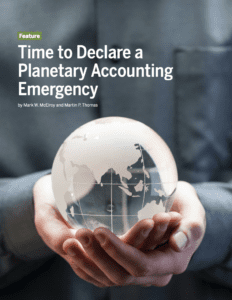Birthplace & Historical Archive of Multicapitalism & Context-Based Accounting
Time to declare a Planetary Accounting Emergency!
As if the Planetary Climate and Coronavirus emergencies were not enough, now comes a Planetary Accounting Emergency, a chronic and widespread failure of performance accounting methods to address the 21st-century needs of business and society in the following ways:
- They fail to ascertain and/or report the environmental sustainability performance of individual companies and/or whole sectors in sufficiently literal terms
- They fail to ascertain and/or report the social sustainability performance of individual companies and/or whole sectors in sufficiently literal terms
- They fail to measure or report the true state of human well-being in the aggregate – be it at the local, national or global level – and instead rely on GDP, which does nothing but reinforce unsustainable behaviors in commerce
Mainstream accounting systems, that is, neither assess nor report the sustainability performance of human activities in authentic triple bottom line terms, and yet that is exactly what they must do in order for us to have any chance of achieving sustainability in the conduct of human affairs.
Worse yet is that our conventional accounting systems actually encourage the adoption of policies and practices that perpetuate – and even facilitate – our social and environmental crises because of what they do measure and report, on the one hand, and what they do not measure and report on the other. This bias comes at the expense of human and environmental well-being, neither of which is measured, much less reported, by current methods in any sort of literal or authentic way. We need accounting that tells us the whole truth and not just a part of it!
Mainstream performance accounting systems, then, are no longer fit for purpose and deprive us of precisely the kind of information we need to effectively manage for sustainability. In effect, we are quite literally gaslighting ourselves to death with our own accounting systems!
Indeed, the human economy and its finance-centric, single bottom line performance accounting systems are dangerously monocapitalistic, in the sense that they promote an ethic that narrowly values the growth and health of only one type of capital, economic, at the expense of all others, even though our health and well-being depend on them. Our problem, therefore, is not capitalism, it is monocapitalism, and the longer we cling to it, the less secure we become.
The solution, we believe, is a new economic doctrine that we call multicapitalism – a system in which businesses and other actors in the world strive to live within their means and ensure the means to live and whose performance is assessed in those terms, accordingly. In multicapitalistic economies, performance is thereby measured, managed and judged in terms of what our impacts are on all vital capitals, not just one of them. And all enterprise-level accounting is performed using Generally Accepted Integrated Accounting (GAIA) Principles, not GAAP or IFRS.
None of the other emergencies we face (climate, biodiversity, water, plastics, population, income inequality, debt, political conflict, racism, etc.) can ever be fully resolved, much less taken up in earnest, unless such accounting systems are first put into place. Why not? Because the information we need to effectively navigate our way out of them is rarely provided by today’s accounting systems. Instead, they incentivize negligent behaviors of precisely the sort that got us into trouble in the first place!
What we desperately need now, therefore, is a new breed of accounting that can help us better understand and manage our own performance in today’s terms. And for that, there can be no better solution than context-based triple bottom line methods, such as the MultiCapital Scorecard, all of which are free and open-source. But will we use them?
* * * * *
For more information about our work in the application of context-based multicapitalistic performance accounting tools at the levels of both individual organizations and whole economies, contact CSO’s Executive Director Emeritus, Mark W. McElroy, PhD. And for an article co-authored by McElroy and Martin Thomas that demonstrates the dramatic differences in performance profiles for companies when viewed through the lenses of single versus triple bottom lines, see here: Time to Declare a Planetary Accounting Emergency (Solutions journal, December 2020).
The Center for Sustainable Organizations
What differentiates CSO from others in the sustainability arena is its strong commitment to an approach for corporate sustainability measurement, management and reporting that is context-based
